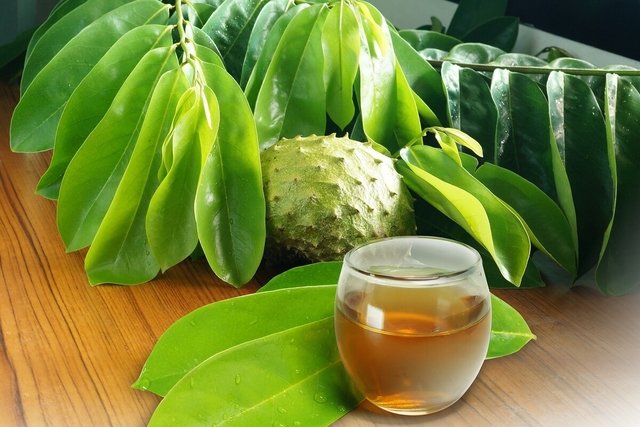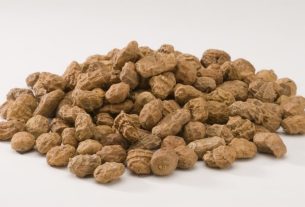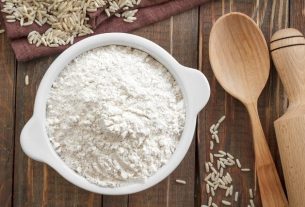Soursop tea is made with the leaves, which are rich in acetogenins, alkaloids, phenolic compounds and vitamins, which makes this tea have anti-inflammatory, antihypertensive, immunomodulatory, antimicrobial and antioxidant effects.
Thus, soursop tea can be used to help combat fever and treat hypertension, high cholesterol and diabetes, for example, as long as it is recommended by a doctor.
Despite having several health benefits, soursop tea should be consumed in moderation, as excessive consumption can result in side effects, such as hypotension, nausea and vomiting.

What is it for
Soursop leaf tea can serve several functions in the body, the main ones being:
1. Help control diabetes
Soursop leaves contain phytochemical compounds, such as tannins, flavonoids and triterpenoids, which help regulate blood sugar levels, as they inhibit the activity of an enzyme related to carbohydrate metabolism. Therefore, drinking soursop tea every day helps keep blood glucose levels balanced in people with diabetes or pre-diabetes.
2. Fight cancer
Soursop leaves have antioxidant and cytotoxic compounds that help eliminate free radicals from the body, preventing cell damage, thus preventing the development of cancer.
Furthermore, this medicinal plant inhibits the growth of malignant cells, helping to fight different types of cancer, such as colon, breast, prostate and pancreatic cancer. However, soursop tea does not replace the treatment recommended by the doctor, but only serves to complement the treatment.
3. Act against parasites
Some of the compounds isolated from soursop leaves and seeds have effective action against parasites responsible for causing diseases, such as amoebiasis, malaria and trypanosomiasis, for example.
4. Act against viruses and bacteria
Soursop leaf extracts have flavonoid, steroid and alkaloid compounds with antibacterial properties against Staphylococcus aureus and Escherichia coli, for example, enhancing the effect of antibiotics and promoting the more effective elimination of microorganisms, in addition to preventing the replication of some viruses.
5. Lower blood pressure
Soursop leaf extract contains alkaloid compounds such as coreximine, anomurine and reticulin, as well as essential oils that have hypotensive properties that act by blocking calcium ion channels, allowing blood vessels to relax and open, being useful for controlling blood pressure. blood pressure in people with hypertension.
6. Boost immune response
Soursop tea has properties that promote an increase in the number of leukocytes, which are blood cells that are part of the immune system, helping to prevent and fight infections and other diseases, such as flu and colds.
7. Protect the liver
Soursop leaves have a hepatoprotective effect, as they work to prevent liver damage caused by medications, such as paracetamol, for example, which can affect the liver when used in excess.
Additionally, soursop tea can help combat hyperbilirubinemia or jaundice, which is caused by changes in the liver or bile ducts.
8. Help cure stomach problems
Soursop leaf extract has a gastric protective effect, helping to alleviate the symptoms of some gastric problems, such as ulcers and gastritis, due to its antioxidant compounds that help protect the gastric wall, reducing acidity, pain and discomfort. be.
9. Decrease stress and anxiety
Due to the content of alkaloid compounds, soursop tea helps reduce anxiety, stress and insomnia, as these substances act on the central nervous system, exerting relaxing effects, in addition to improving mood.
10. Promote wound healing
Soursop leaf extract contains antioxidant compounds that protect tissue against oxidative damage, accelerating the wound healing process, as well as increasing the availability of collagen and proteins that promote the growth of new cells to repair tissue. Therefore, soursop tea in the form of a poultice can be used to place on wounds and, thus, promote faster healing.
Properties of soursop leaf tea
Soursop leaves are rich in phytochemicals, such as acetogenins, alkaloids, phenolic compounds, vitamins and carotenoids, which guarantee hypoglycemic, hypotensive, antispasmodic, sedative, anticancer, anti-inflammatory, immunomodulatory, antimicrobial, healing and sedative properties. Discover other benefits of soursop.
How to make tea
Soursop tea is easy and quick to make, and you can consume 2 to 3 cups of soursop tea per day, preferably after meals.
Ingredients
- 10 g of dried soursop leaves;
- 1 liter of boiling water.
Preparation mode
To make the tea, simply place the soursop leaves in boiling water and leave for about 10 minutes. Then, it should be strained and consumed when it is warm after meals.
How long to drink tea
There are no scientific studies that indicate how long it is safe to drink soursop leaf tea, but the general recommendation for any type of tea is to drink it for 3 months and take a break for 1 month.
However, it is important to consult a health professional who specializes in natural plants or a herbalist before starting to consume soursop tea, as the time of use may vary according to the person’s health status.
Side effects
Although soursop has several benefits, the consumption of soursop tea must be guided by a herbalist or nutritionist, as consumption in large quantities can result in nausea, vomiting, a sudden decrease in blood pressure and intestinal changes, since due to its antimicrobial properties, It is capable of eliminating good bacteria from the body when consumed in excess.
Furthermore, the consumption of soursop by pregnant women is not recommended due to the fact that it may result in premature birth or miscarriage.

Sign up for our newsletter and stay up to date with exclusive news
that can transform your routine!
Warning: Undefined array key "title" in /home/storelat/public_html/wp-content/plugins/link-whisper-premium/templates/frontend/related-posts.php on line 12
Warning: Undefined array key "title_tag" in /home/storelat/public_html/wp-content/plugins/link-whisper-premium/templates/frontend/related-posts.php on line 13



